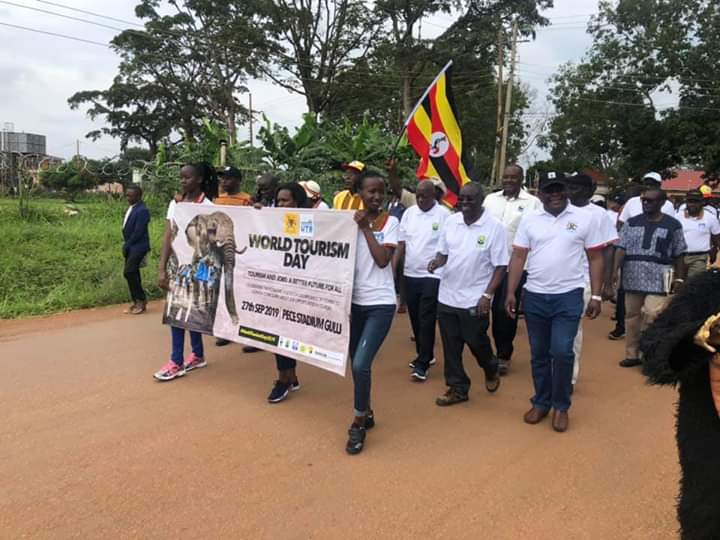
GULU —The tourism fraternity has on Friday 27 converged in Gulu town to mark World Tourism Day.
Celebrated globally, World Tourism Day is meant to raise awareness of the importance of tourism.
The theme this year is “Tourism and jobs: a better future for all”.
Vice President Edward Ssekandi is presiding over the national celebrations.
The day is aimed at creating awareness of tourism power to drive inclusive development, create jobs and build the sustainable societies for the future.
Uganda Tourism Board in a tweet said this is an opportunity to show the tourism potential in the northern region.
As part of the festivities, a week long exhibition of arts and tourism in Uganda was held at Pace stadium in Gulu.
The activities included tree planting at Kaunda stadium, blood donation at Pece stadium, secondary school tourism quiz at Layibi College and the tourism stakeholder engagement.
Mr. Sekandi who is the chief guest has inspected Uganda Wildlife Authority exhibition stall.
President Museveni in June this year revealed that tourism has increasingly become important to Uganda’s economy.
He noted that the sector is a driving force in propelling economic growth and that it continues to be the leading foreign exchange earner for Uganda generating US$1.45 bn foreign exchange earnings in 2017 compared to USD 1.37 billion in 2016.
In 2018, according to figures, the sector registered increased performance as reflected in the visits to Uganda’s National Parks and other sites including Uganda Wild Life Education Centre and the Source of the Nile.
UTB statistics indicate that visitors to National Parks increased by 39,674 from 285,671 in 2017 to 325,345 in 2018.
This is a great score for Ugandan Tourism, the top foreign exchange earner for the country’s economy.
Although the proportion of leisure visitors to total visitor arrivals is still relatively small, results show that it increased from 18% in 2016 to 20.1 % in 2017 and Tourist arrivals into Uganda have steadily increased from 850,000 in 2008 to over 1.4 million arrivals in 2017.
On direct contribution of Tourism to GDP, the President Museveni said that in 2017 was UGX 2,699.1billion (2.9% of GDP) while the total contribution including wider effects from investment, the supply chain and induced income impacts, was UGX 6,888.5bn in 2017 (7.3% of GDP), up from UGX 6,171.5bn in 2016.

In terms of contribution to employment in the economy, Mr Museveni noted that the sector generated 229,000 jobs directly in 2017 (2.4% of total employment).
This includes employment by hotels, travel agents, airlines and other passenger transportation services but excluding commuter services.
Mr. Museveni said that the overall goal for the Government is to attract 4 million tourist arrivals and increase the contribution of tourism to GDP from Shillings 7.3 trillion to Shillings 14.68 trillion at the end of the year 2020.
To achieve this, he said government will continue to focus on Human-Wildlife Conflict; Community engagements; Resource Conservation; Research and Ecological monitoring and the general management of Uganda’s 10 National Parks and 12 Wildlife Reserves.
As much as the tourism sector in Uganda continues to thrive, Lawrence Kalema, a tourism entrepreneur, said government is not doing a lot in key areas including international marketing — reflecting why some countries are doing better than Uganda in the tourism sector and yet we have some of the rare natural earth resources including the source of River Nile.
Among some of the problems the tourism sector continues to face include poor service delivery, high transport costs, high rate charges in some of the accommodation facilitates, limited marketing due to inadequate funding, high competition from the neighbouring countries and inadequate physical infrastructure for internal flights.
“The government is gaining more from us yet they contribute less mainly in international marketing,” he said adding that taxes are very high yet, roads linking to key tourist destinations are in poor state.
He said government should start marketing the country at an international level — giving an example of Rwanda’s partnership with Arsenal.
“See Rwanda now, they got a few attractions, expensive but they market.”
He also believes that if it wasn’t gorillas, “our tourism industry wouldn’t have been popular.”
He said gorillas, one of the endangered species in the world attract more than 85 percent of the tourists.
He says Uganda should not be known for only but things but rather in terms of the wonderful things she has to offer





